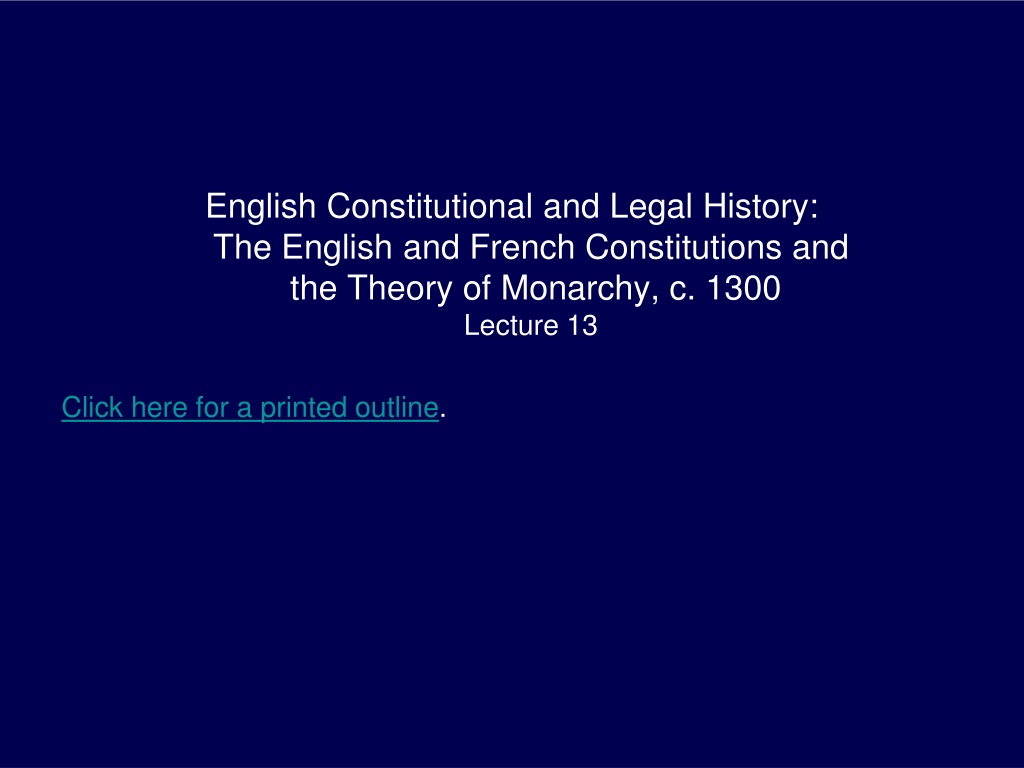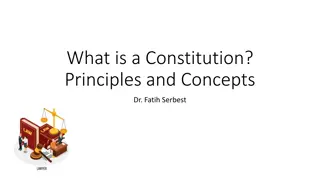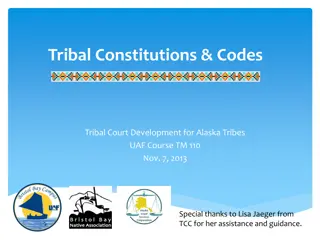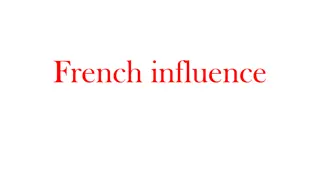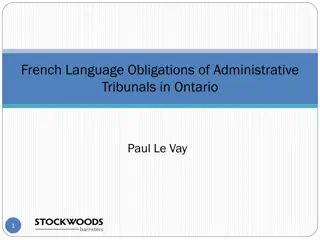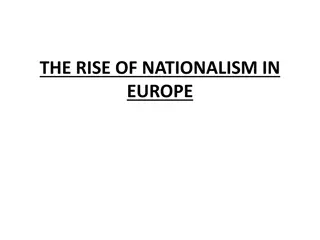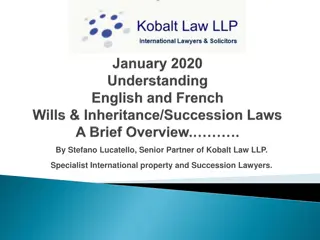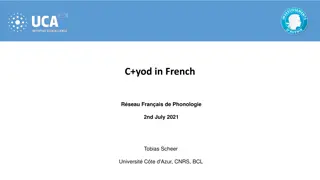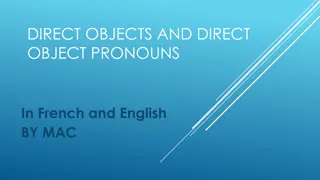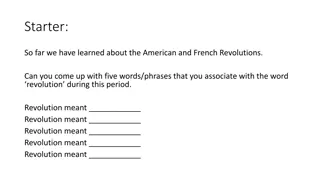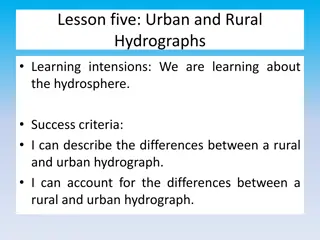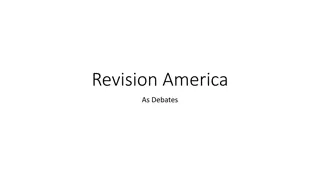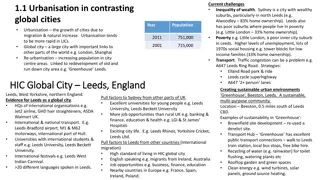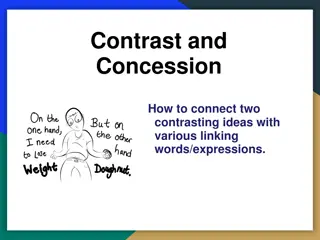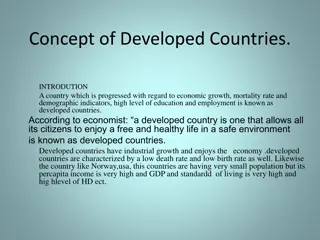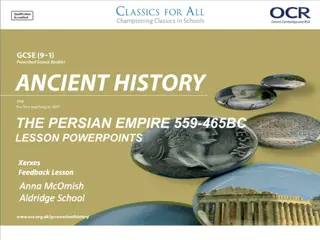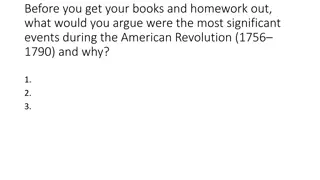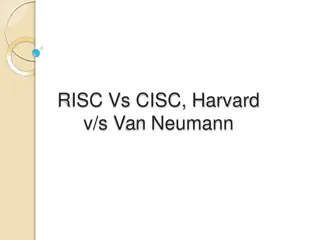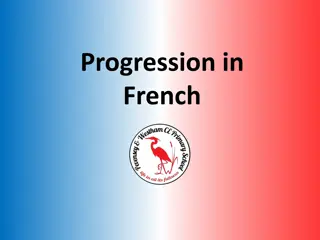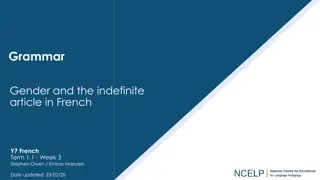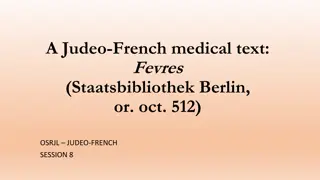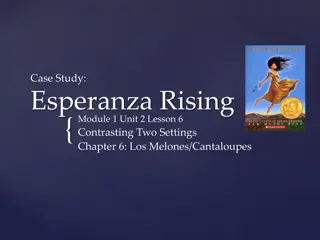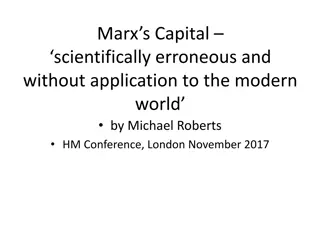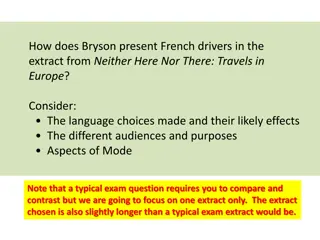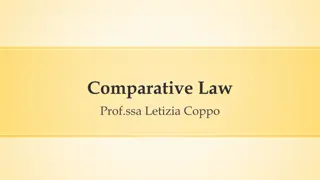Contrasting English and French Constitutions circa 1300
France and England's constitutions in the 1300s exhibited notable differences in legal systems, representation structures, and legislative activities. While England had common law and a developed Parliament, France operated under regional customary laws with limited legislative functions and a distinct estate-based representation system.
Download Presentation

Please find below an Image/Link to download the presentation.
The content on the website is provided AS IS for your information and personal use only. It may not be sold, licensed, or shared on other websites without obtaining consent from the author. Download presentation by click this link. If you encounter any issues during the download, it is possible that the publisher has removed the file from their server.
E N D
Presentation Transcript
English Constitutional and Legal History: The English and French Constitutions and the Theory of Monarchy, c. 1300 Lecture 13 Click here for a printed outline.
The topic of this lecture To get an overview of the English constitution in the year 1300, I want first to compare and contrast the English and French constitutions in this period and then look at a specific group of texts on the topic of kingship. The outline has what I m going to say almost fully written out because there s little in the readings about France. One of the odd effects of nationalism on historiography is that very few people who write about English constitutional history say anything about France, and very few people who write about French institutional history, which what the French call constitutional history, say anything about England.
Basic chronology (Mats., V54) Louis VI (the Fat) 1108 1137, time of Henry I Louis VII (the Young) 1137 1180, time of Stephen and Henry II Philip II (Augustus) 1180 1223, time of Richard I and John, recovered Normandy and launched Albigensian Crusade Louis IX (St. Louis) 1226 1270, time of Henry III Philip III (the Bold) 1270 1285, time of Edward I Philip IV (the Fair) 1285 1314, war with Edward I, conflict with Pope Boniface VIII 1302 the Estates General 1307 1312 destruction of the Templars
Differences in the two constitutions, c. 1300 France is a country that is in many ways quite similar to England. And yet by 1300 the constitutions of the two countries were markedly different: There is no common law in France. The country is divided into the land of customs, pays de droit coutumier, roughly the northern two- thirds of the country in which each area has its own customary law, and the land of the written law, pays de droit crit, roughly the southern third, in which Roman law is dominant. In the 14th century the French lawyers will come to speak of the ius commune, the common law, but what they mean is the law taught in the universities, a mixture of Roman and canon law. There is no parliament in France. There is the parlement of Paris, like the English parliament, the most important court of the realm, but there its functions cease. If we are looking for a representative body we must look at the Estates General, an important institution but one that is only beginning in the early 14th century, and which never is united with the parlement.
Differences in the two constitutions, c. 1300 (contd) There is no legislative activity in the area of private law comparable to that of Henry II or Edward I. The closest we come is an important procedural ordonnance of St. Louis. Local royal administration there is, and it is not unlike that in England, but by and large it operates only in the lands directly dependent on the French crown, the French equivalent of the English ancient demesne.
Why these differences? Justice in France is a seigneurial matter, as it was in England in the early 12th century. Whether the theory is fief and justice are one (fief et justice sont un) or fief and justice have nothing in common (fief et justice n ont rien de commun), the fact is that justice is a seigneurial matter at the county level and sometimes lower. At the beginning of the 13th century there is no mechanism for getting from these courts to the royal courts, except, of course, in the case of the royal demesne. The notion of royal county courts does not exist. There are no itinerant justices. Procedure in these courts is archaic and oral with a feudal overlay of trial by battle. There is no hint of a jury. The ordeal died much slower in France than it did in England. Louis IX abolished trial by battle and replaced it with the Romano-canonic inquest procedure. This is the single most striking illustration of the importance of chronology. If Saint Louis had reigned in the time of Henry II the developments might well have been the same because Romano-canonic inquest procedure had not been invented in Henry II s time.
Why these differences? (contd) Of course the French king had a court, known as in England as the curia regis, and he summoned his vassals to it, among other things, to hear cases. The 13th century sees an increasing number of professionals in attendance at the court and during the reign of St. Louis it begins to acquire distinct functions: curia in concilio, curia in parlemento, curia in compotis. The parlement heard appeals from the bailiffs and seneschals, first from the newly conquered south, then from the north, then from the seigniorial tribunals. The parlement was also involved in the trial of cases involving peers, the jugement des pairs. But appeal is not the same thing as hearing cases at first instance. The parlement did not attempt to impose a uniform law, but to see to it that the bailiff correctly applied the local law.
Central financial administration and local administration In the time of Philip Augustus France began to develop a financial administration. The bailiffs rendered accounts as at the English exchequer. Indeed, French budget-making may be superior to English in this period. But the French exchequer does not have a writ system. Its functions remain essentially financial, and a judicial system does not develop out of it. The bailiffs and the seneschals, the royal officials, began as itinerant but became local. They are officers of justice like the sheriffs in England, but they retain full competence.
Differences in underlying ideas The theory of the monarchy, as in England, is a blend of ideas derived from feudalism (the king is the lord of all), from Roman law (the king is emperor in his own realm), and from Christianity (the king is the lord s anointed). By the time of Philip the Fair, it is the second idea that has come to dominate, and we will see shortly that this may also be true in England.
Differences in underlying ideas (contd) The notion of community may be stronger in France than it is in England, which is not to say that it wasn t strong in England too. It begins in the family, where already in the 13th century we see ideas of community property between spouses. The notion of estates of the realm, classes of people within the society having a corporate quality is barely visible in France in 1302 with what may be the first Estates General, but it is powerful at the provincial level. It will come to develop on the national level in England in the 14th century. On the other hand, the concept of the community of the realm is weaker in France than it is in England, where it is clearly present in the 13th century. In France we really have to wait for the Hundred Years War (1337 1453) before it develops.
Differences in underlying ideas (contd) We see in France as we do not in England a notion that the only law that binds the monarchy is the law of succession. This is not the only idea about the law and the king floating around in the M.A., and modern historians may have overemphasized it with the advantage of hindsight. The Estates General when it develops is a consultative body dealing with taxation and treaties, only occasionally making initiatives. For our purposes its separation from the regular judicial function may be its most important characteristic. In France the tendency toward centralization comes in a time when feudalism is on the decline. The barons never united in France to oppose the king; there is no Magna Carta, no Provisions of Oxford. Each feudatory held his privileges separately
England vs. France Summary Despite these substantial differences, and unlike many historians, I would tend the emphasize the similarities rather than the differences between England and France. The economy of ideas is very similar in the two countries, and while the difference in institutions is certainly there, they are recognizably of the same institutional stock. The history of the two countries will diverge remarkably in the 17th century, but anyone who looks at the two countries in 1300 and sees Louis XIV and the Glorious Revolution is looking at the pattern through the strange glasses of hindsight.
Ideas about kings Bracton (Mats., 5F) To give some sense of what I mean about the economy of ideas, let us take a closer look at theories about kingship. The author I have chosen for England is Bracton. Bracton we now know is the name of a committee, one of whom, and perhaps not the most important of whom, was Bracton. Most of the book we now know was written before 1236. One or more of the authors of Bracton knew a lot of Roman law. The passages on kingship are among the best known in the book. There are considerable complexities in these passages, not the least of which are the result of the fact that the final redaction of the text was done by someone who didn t understand it, But the main outlines are clear enough. The trick to reading this text is to assume that the material in italicized square brackets in the Mats. is glosses added by a later author. This is a quite recent discovery, and the argument for doing it can be seen quite clearly in the first sentence of the first paragraph. The king has no equal within his realm, [Subjects cannot be the equals of the ruler because he would thereby lose his rule, since equal can have no authority over equal.] nor a fortiori a superior, because he would then be subject to those subjected to him.
Ideas about kings Bracton (Mats., 5F) (contd) The first statement of the theme comes at the beginning of the book in the section on persons when Bracton is talking about the king. The king has no equal in his realm, and, of course, no superior. The bracketed gloss states a theory pretty close to what we would call sovereignty. The paragraph (omitting for a moment the glosses) continues: The king must not be under man but under God and under the law, because law makes the king, for there is no rex where will rules rather than lex. Since he is the vicar of God, there ought to be no one in his kingdom who surpasses him in the doing of justice, but he ought to be the last, or almost so, to receive it, when he is plaintiff. f it is asked of him, since no writ runs against him there will [only] be opportunity for a petition, that he correct and amend his act; if he does not, it is punishment enough for him that he await God s vengeance.
Ideas about kings Bracton (Mats., 5F) (contd) But the king is under God and under the law. The king therefore ought to surpass all in the doing of justice. But because he has no equal there is no legal remedy against him, only a remedy by way of petition. If he does not adhere to the petition, God will judge him. This is a very traditional statement of the descending theory of power, and it is reinforced by the religious analogies in the big gloss: And that he ought to be under the law appears clearly in the analogy of Jesus Christ, whose vicegerent on earth he is, for though many ways were open to Him for his ineffable redemption of the human race, the true mercy of God chose this most powerful way to destroy the devil s work, he would use not the power of force but the reason of justice. Thus he willed himself to be under the law that he might redeem those who live under it. For He did not wish to use force but judgment. And in that same way the Blessed Mother of God, the Virgin Mary, Mother of our Lord, who by an extraordinary privilege was above law, nevertheless, in order to show an example of humility, did not refuse to be subjected to established laws. Let the king, therefore, do the same, lest his power remain unbridled.
Ideas about kings Bracton (Mats., 5F) (contd) The king is the vicar of God; he should submit himself to the law as Christ submitted himself to the law, as the Virgin Mary submitted herself to the law. The only problem with the religious analogy is that it admits an element of paradox. In the traditional statement the king was under the law; there was just no remedy on this earth against him, but the exploration of the religious analogy suggests that the king is in some sense freed from the law, but voluntarily submits himself to it. We may call this Bracton s paradox. Other authors in this period will resolve the paradox by saying that the king is subject to divine law or natural law, but is not subject to human law, or that he is the source of human law. But, as we will see, this is not Bracton s resolution. The question is does Bracton have a resolution or does it remain a paradox? I m going to skip the second passage for a moment, the so-called addition about charters. Some have doubted that it is part of the original text rather than something added at the time of the Barons Wars. The next passage concerns the power of the king to grant privileges:
Ideas about kings Bracton (Mats., 5F) (contd) It is clear that the lord king [has all] dignities, rights or jurisdictions in his hand. He also has, in preference to all others in his realm, privileges by virtue of the jus gentium. [By the jus gentium] things are his which by the jus naturale ought to be the property of the finder, as treasure trove, wreck, great fish, sturgeon, waif, things said to belong to no one. Also by virtue of the jus gentium [things] which by natural law ought to be common to all, as wild beasts and undomesticated birds, which by natural law ought to be acquired by apprehension and capture or fowling, [or] by occupation and apprehension, [as] of another s property, as where a thing is cast away and taken to be abandoned. Those concerned with jurisdiction and the peace cannot be transferred to persons or tenements, neither the right nor the exercise of the right, nor be possessed by a private person unless it was given him from above as a delegated jurisdiction, nor can it be delegated without ordinary jurisdiction remaining with the king himself. [cont d on next slide]
Ideas about kings Bracton (Mats., 5F) (contd) Those called privileges, however, though they belong to the crown, may nevertheless be separated from it and transferred to private persons, but only by special grace of the king himself; if his grace and special grant do not appear time does not bar the king from his action. Time does not run against him here since there is no need for proof. For it ought to be apparent to all that such things belong to the crown unless the contrary can be shown by a special grant. In other matters, however, where proof is needed, time runs against him just as against all others.
Ideas about kings Bracton (Mats., 5F) (contd) The passage originally said: The lord king has all dignities, rights or jurisdictions in his hand. Some examples are given such as treasure trove and hunting. Another example is jurisdiction. But jurisdiction is different. It cannot be alienated but only delegated, and the delegation must leave ordinary jurisdiction in the king s hand. Privileges, however, (treasure trove and hunting might be examples) may be granted by the king but a grant must be shown. Royal privileges cannot be acquired by prescription. The glossator came along and made it more complex. In the first place (the second gloss) he added a justification for the concept of inalienability of sovereignty. Those connected with justice and the peace belong to no one save the crown alone and the royal dignity, nor can they be separated from the crown, since they constitute the crown [For to do justice, [give] judgment and preserve the peace is the crown.] without which it can neither subsist nor endure. The king cannot give away jurisdiction because to do so would be to give away the crown. Jurisdiction is of the essence of the crown. That much is clear. What the big first gloss does is less clear:
Ideas about kings Bracton (Mats., 5F) (contd) [It is the lord king] himself who has ordinary jurisdiction (jurisdictio) and power over all who are within his realm. For he has in his hand all the rights belonging to the crown and the secular power and the material sword pertaining to the governance (gubernaculum) of the realm. Also justice and judgment [and everything] connected with jurisdiction, that, as minister and vicar of God, he may render to each his due. Also everything connected with the peace, that the people entrusted to his care may live in quiet and repose, that none beat, wound or mistreat another, [or] steal, take and carry off by force and robbery another s property, or maim or kill anyone. Also coercion, that he may punish and compel wrongdoers, [omitting the gloss on the gloss] for it is useless to establish laws unless there is someone to enforce them. A great scholar of the last generation, Charles McIlwain, without knowing that this was a gloss, thought that the passage drew a distinction between jurisdictio and gubernaculum. In exercising jurisdictio the king was subject to the law, but in exercising gubernaculum he was not. I must confess that I don t see a distinction between the two being drawn here, nor do I see any indication that the king s relation to the law is any different in the two. The paradox remains; the king is both above and below the law.
Ideas about kings Bracton (Mats., 5F) (contd) The final passage comes from the section in which Bracton. treats of jurisdiction generally: To this end is a king made and chosen, that he do justice to all men [omitting the gloss on the gloss] and sustain and uphold what he has rightly adjudged, for if there were no one to do justice peace might easily be driven away and it would be to no purpose to establish laws (and do justice) were there no one to enforce them. The king, since he is the vicar of God on earth, must distinguish jus from injuria, equity from iniquity, that all his subjects may live uprightly, none injure another, and by a just award each be restored to that which is his own. He must surpass in power all those subjected to him, nevertheless, since the heart of a king ought to be in the hand of God, let him, that he be not unbridled, put on the bridle of temperance and the reins of moderation, lest being unbridled, he be drawn toward injustice. For the king, since he is the minister and vicar of God on earth, can do nothing save what he can do de jure. His power is that of jus, not injuria, as vicar and minister of God on earth, for that power only is from God, whose work he performs. Therefore as long as he does justice he is the vicar of the Eternal King, [cont d on next slide}
Ideas about kings Bracton (Mats., 5F) (contd) but the devil s minister when he deviates into injustice, For he is called rex not from reigning but from ruling well, since he is a king as long as he rules well but a tyrant when he oppresses by violent domination the people entrusted to his care. Let him, therefore, temper his power by law, which is the bridle of power, that he may live according to the laws, for the law of mankind has decreed that his own laws bind the lawgiver, and elsewhere in the same source, it is a saying worthy of the majesty of a ruler that the prince acknowledge himself bound by the laws. This says that the function of the king is to do justice. This is what he swore to do at his coronation. In doing justice he is the vicar of God on earth. But if he does injustice then he is not the vicar of God but the vicar of the devil; he is not a king but a tyrant, quoting John of Salisbury, who went on, as the author of the passage does not, to suggest that a tyrant might be deposed. The passage concludes with some reflections on the relationship between justice and mercy. In the middle of the passage comes the troublesome gloss:
Ideas about kings Bracton (Mats., 5F) (contd) . . . despite the statement that the will of the prince has the force of law, because there follows at the end of the lex the words since by the lex regia, which was made with respect to his sovereignty ; nor is that anything rashly put forward of his own will, but what has been rightly decided with the counsel of his magnates, deliberation and consultation having been had thereon, the king giving it auctoritas. What is going on here is an extraordinary twisting of the most absolutistic of texts in Roman law: What pleases the prince has the force of law, since by the lex regia the people have given all authority to him. It is hard not to conclude that the author of the gloss is rejecting the Roman text and saying that the lex regia in England does not give the king the power to make all laws by himself, but only with the counsel of his magnates, deliberation and consultation having been had thereon, the king giving it auctoritas.
Ideas about kings Bracton (Mats., 5F) (contd) This view is confirmed in the second passage, the one that I skipped, with the mysterious statement that the curia is superior to the king and may put a bridle on him. But this is not the mainstream argument of the text. The mainstream argument of the text establishes a hierarchy descending from God to the law to the king. The law makes the king. If the king does not do according to the law he unmakes himself king. There is no legal remedy if this happens, but God s judgment will be severe. In the middle of the century people were thinking of mechanisms whereby they might be able to help God in rendering his judgment. Wild- eyed radicals would suggest a right of revolution. This seems to be the argument of the second extract, the one that I skipped. But for most, and I would suggest for the mainstream of our text, the paradox remained unresolved. It was to remain so for a long time.
Pierre de Mornay on the power of the king (1278) This author of this quaestio disputata is probably the Pierre de Mornay who went on to become a councilor of Philip IV, bishop of Orl ans and then of Auxerre, and briefly chancellor of France before his death (1306). The . . . question was this: There was a custom in Brittany that if anyone of the jurisdiction of the count [?duke] of Brittany was called before the count in either a civil or a criminal case, he could complain or appeal to the king of France, and thus the count could not further lay hands on the matter. Then the king of France wished to remit this right to the count, indeed we put it that he did so de facto, without calling the barons. Query whether this remission is valid or not? And the doctor discussed this question briefly. First, he argued that is valid according to the law, [citing Roman law]. Since the king of France is reputed not to have a superior to himself in his lands, and hence by a certain error he reputes himself to be the prince. He can grant whatever rescript he wishes to in his subordinates, so long as the right of an adversary is not totally damaged or taken away. By this remission the right of the barons was not taken away entirely nor that of any other subordinates, therefore, etc. [cont d on next slide]
Pierre de Mornay on the power of the king (1278) (contd) But the doctor in determining to the contrary said: Now something which would be tolerated in the persons of other lesser persons is reputed a great error and great iniquity [reading iniquitas] [when done to] many persons or those of a given province. [Once more citing Roman law.] Sir Peter Mornay disputed these question in 1278 on the Friday before Christmas. The text of the last sentence is somewhat garbled, a warning to all students then and now not to rely on their notes if they don t seem to make sense. Exactly what limits Mornay proposed on the king s power is not completely clear. What is clear is that he thought that there were some limits on it, and it is probably significant that what he seems to say can be made to track with what the gloss in Bracton says about consultation with the magnates.
Beaumanoir on the power of the king (before 1285) Philippe de R mi, sieur de Beaumanoir, wrote an extensive treatise on the customs of Clermont-en-Beauvaisis, the longest and best known treatise on French law in the 13th century. The text probably dates from before 1285. The extracts (Mats. 5G) are more complicated than they look, particularly if one asks the question whether Beaumanoir is playing with the distinction that was being developed on the Continent in this period between absolute and ordained power even though he doesn t use the terms. He is particularly concerned to give the king great power, even to give barons great power, in times of emergency. The first extract is more like an aside that appears in the section of the book that deals with written obligations. 1103. ... It is also the king s right, notwithstanding any waiver that anyone has put into writing, whether general or special, that the king may, if the debtor is joining the king s army or going on crusade against the enemies of the faith, have the debt postponed [aterminer], according to the needs of those going with him, or who are going on some necessary business at his command, for what he wants to do should be taken for law. But this can be done by no one but him in the kingdom of France. . . .
Beaumanoir on the power of the king (before 1285) At least three concepts may be involved here, none of which is spelled out: (1) that public law can trump private law, (2) that he who has the power to make a law can also dispense from it, and (3) that no general law can sensibly be applied to all situations (the basic insight of equity)
Beaumanoir on the power of the king (before 1285) (contd) The rest of the extracts come from a section called Laws and Times of Emergency : 1510. There are exceptional times when you cannot and should not do what has been lawful [pour droit] by long custom and practice, for example anyone can know that there are two kinds of times: war and peace. And it is reasonable for peace time to be dealt with according to the usage and custom which has been habitual and developed [usees et acoustumees] over a long period for life in peacetime ... . But in times of war or fear of war, kings and princes, lords who hold directly from the king [barons] and lower ones, have to do many things which, if they were done in times of peace, would be wrongs towards their subjects; but the emergency [tans de necessit ] excuses them, so the king can make new laws for the common good of the kingdom: for example, when he thinks he will have to defend his land or attack someone who has wronged him, he is accustomed to order that gentlemen who are squires be all made knights, and the rich men and poor should furnish armor, [cont d on next slide]
Beaumanoir on the power of the king (before 1285) (contd) each according to his position and that towns should repair their fortifications [services] and their fortresses, and that everyone be ready to move when the king gives the order. The king can give all such laws and others which seem right to him and his counsel in time of war, or fear of war to come; and the barons can do the same in their lands, provided it is not in order to take arms [emprendre] against the king. 1512. No one can make a new law [establissement] which will be enforced as such [pour droit], or a new market, or new customs, except the king in the kingdom of France, save in times of emergency [necessit ], for in those times every baron can force the sale of his subject s goods, as we have said above; but they cannot make new markets, nor new customs [coustumes] without the king s permission. But the king can do this when he likes, and when he sees it is for the common good, for example, we see the king giving new customs every day to certain towns which are his own or to certain lords among his subjects, for example to repair bridges or roads, or churches, or various other public words [aaisemens communs]; in such cases the king can act, but not others.
Beaumanoir on the power of the king (before 1285) (contd. 1513. You should know that if the king makes some new law for the common good, it does not affect things done in the past, nor things which will happen in the future, until observance of the law has been ordered. ... 1515. Although the king can make new laws, he must take great care to make them for reasonable causes and for the common good, and after much consultation [par grant conseil], and especially they must not be made against God or against morality [bonnes meurs]; for if he did (which will never happen, with God s help), his subjects should not permit it, for each person should above all things love and fear God with all his heart and for the honor of Holy Church, and after that his earthly lord. And everyone should obey the commandments of our Lord in the hope of the reward of heavenly treasures [des biens celesiaus], and after that obey his earthly lord according to what one should do for one s temporal goods [les possessions temporeus]. Here ends the chapter on laws and times of emergency.
Beaumanoir on the power of the king (before 1285) (contd) In the end Beaumanoir s basic theory is relatively straight-forward. He seems to concede to the king and to no other what we would call legislative power. Like others in the period he limits the king s power to make such laws by a general appeal to morality and to divine law. He says that the king must take counsel before he makes laws, but does not specify how he is to do it. The theory is straight-forward, and not particularly sophisticated. What is to happen if the king fails to obey divine law is simply not discussed, other than in the suggestion that people do not have obey royal laws that contradict divine law. I don t think that there s anything in Beaumanoir with which the multiple authors of Bractonwould have disagreed, but he certainly doesn t seem to see the problems that they see. That is probably the result of the fact that the passage was written when there was a rather ineffectual king whose father was certainly not ineffectual, but was a saint. What is very much in the mind of the authors of Bracton, as it is not in Beaumanoir s, is not the Barons Wars, as the previous generation of scholars thought, but Magna Carta. If you have a theoretical bent, and Magna Carta and the events leading up to it are in your mind, the problem of how do you make the lord who has no lord obey the law won t go away.
